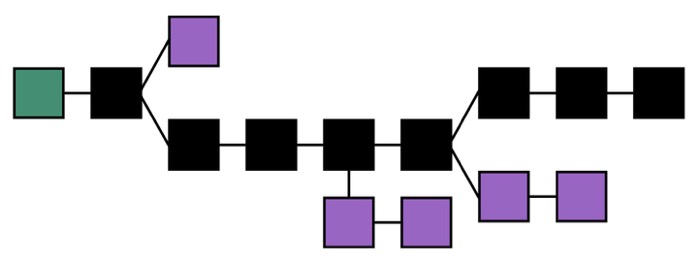What Is Blockchain for Publishing? And, Will Blockchain Be the Next Publishing Revolution?

So, since your publishing team is always out there on the cutting edge, are you getting in on this thing called blockchain?
A phone call with a veteran journalist this week was the first time we’ve been asked about this technology—a red-hot topic at the moment because digital innovators are going crazy over a job posting spotted on The New York Times website. The posting sought a top journalist-and-software-developer to head up a multi-year effort to develop a blockchain plan for the newspaper’s future. Headlines popped up about that short-lived NYTimes posting on countless blogs, email newsletters and niche news sites with names such as: ChainBits, CryptoGround, Coin Guild, Bitcoin Exchange Guide, CoinTelegraph and CoinDesk.
Naturally, netizens of the global Bitcoin Empire were thrilled! They took heart that the venerable NYTimes appears to be betting on these concepts that form the backbone of cryptocurrencies. For its part, the NYTimes staff quickly removed the job posting—and indie journalists were unsuccessful in finding any staffer at the newspaper to comment.
The Independent Book Publishers Association (our own trade group, better known as the IBPA), reported on blockchain in its November-December 2018 magazine, an issue that is not currently online for readers without an IBPA membership. However, we can say that the IBPA’s six-page report concludes: It isn’t clear yet if investment in blockchain will yield meaningful returns.
So far, the trade journal Publishers Weekly (PW) has published at least a dozen news reports mentioning blockchain in the past year. Mainly, PW columns emphasize that the technology is still emerging, many questions still need to be answered—and most publishers are not eager to dive into a concept that has as many skeptics as advocates. News stories tend to describe blockchain’s potential as hype,
as in this PW column that says, in part:
Although promising to explore Publishing Applications of Blockchain Technology, the panel, organized by the Book Industry Study Group, actually provided a critical examination of the promise as well as the reality of a much-hyped but barely understood technological innovation. The panel, held November 8 in New York City, was moderated by Fortune business and technology reporter Jeff John Roberts. The panelists navigated a range of issues surrounding blockchain, a foundational technology supporting the functionality of cryptocurrencies such as bitcoin, and the potential the technology holds for a variety of industries and applications. But like most discussions of blockchain, even describing what the technology is takes some effort.

What You Need to Know about Blockchain in Publishing in
Consider this a crash course in Blockchain for Publishing 101. In one place, here are some starting points to learn more about this emerging issue. Please, contact us if you find other helpful links we should include in this report—and we will update this column. If you are suddenly hearing this phrase blockchain for publishing
for the first time—you can quickly bone up on the concept by following these links. As always, we encourage you to share this column with friends via email and social media.
Blockchain for Publishing 101
Start with Wikipedia
As in all research these days, you’ll want to visit Wikipedia first for a lengthy, robust overview of Blockchain
—in general, not specifically for publishing. You’ll learn about its close relationship with the controversial development of bitcoin, about the exciting potential of blockchain theoretically to create easy-to-access systems for trading and selling the various forms of intellectual property surrounding a book—including actual eBooks themselves. Before you leave the Wikipedia page, check out the footnotes, which offer links to lots of other sources.
Implications for Government
One year ago, the Congressional Research Service published this 14-page report on the possible significance of this development for federally funded programs. That report includes this helpful summary:
A blockchain is a digital ledger that allows parties to transact without the use of a central authority as a trusted intermediary. In this ledger, transactions are grouped together in blocks, which are cryptographically chained together in a way that is tamper-proof and creates a mathematically indisputable history. Blockchain is not a new technology; rather it is an innovative way of using existing technologies.
The New York Times
Most of what the NYTimes has published over the past year about blockchain has been highly skeptical. Here’s a column that opens with the line: This is bonkers.
Mid-way through the column, you’ll find:
While prognosticators love to talk about crypto and blockchain as a bubble, it is likely just very early days. … Think about blockchain like this: There will be huge failures and misspent money — and yes, scams (the Securities and Exchange Commission can hardly keep up with the number of fraudulent players out there), but a decade from now, when you look back at , it’s more likely than not that blockchain will be embedded in our day-to-day lives in ways that, today, we can’t even imagine.
Reading that column, in light of this week’s frenzy over a job posting, it does sound like the NYTimes tech gurus were making a carefully calculated bet in posting their help wanted
item seeking someone to head up a multi-year
research and development project on blockchain. Yes, they took the posting off their public website to cool the speculation—but it’s likely they still plan to at least explore this strategy.
Morgan James and Publica
Coverage of blockchain in American publishing tends to mention the joint venture between Morgan James—a mid-sized hybrid publishing house that describes itself as created by an entrepreneurial author for entrepreneurial authors
—and Publica, founded by a pair of Eastern European developers with experience in bitcoin. In a PW article, Morgan James founder David Hancock argues that this system holds huge promise in finally letting eBook owners truly own
their digital volumes—in other words, untethered from a management system like Kindle or Nook.
For its part, Publica is encouraging authors to launch Book ICOs (Initial Coin Offerings) to meld both cryptocurrency and publishing into a seamless operation. However, so far, there aren’t a lot of takers. A noticeable share of Publica’s initial books are about—yup, you guessed it, doing business through bitcoin. They’ve also launched a few novels and self-help titles—plus a handful of public-domain books by classic authors such as Shakespeare, Twain and Tolstoy. The Publica co-founders freely admit that they don’t vet manuscripts, insisting in the IBPA report, that they are true believers in letting the larger online public decide for themselves.
In other words, this is old-fashioned, pay-to-play vanity publishing fueled by new technology.
Streamlining Rights for Publishers
There are other major arguments for the value of blockchain. The real value in publishing is what’s called the backlist,
the existing books that keep selling every year. In this new era of multi-format media, obtaining the rights to use all or part of a backlist book is a complex matter. Beyond movie rights, audio rights and all the other traditional requests, a host of other media professionals now are considering paying for bits and pieces of a book. However, long-standing publishers are infamous for keeping dusty shelves of ink-on-paper documents stored away—requiring an army of minions to track down responses to requests for permissions.
So, this is one potential of blockchain. Rights requests from paying customers could be quick money for publishers—instead of today’s cumbersome research procedures that take time and tend to push away potential customers. The potential of blockchain rights management is that people seeking to purchase rights could simply log into an automated system and purchase rights rapidly—perhaps within a matter of minutes. At best, that’s the speculative idea. PW just ran two articles in about companies promoting the idea. Here’s one article about a children’s book publisher and one about an India-based company called Lumina Datamatics.
Skeptics
There are tons of skeptics, of course. Widely cited is this Los Angeles Times report from that questions whether bitcoin technology is merely a costly fad
. The biggest complaint? The physical systems to produce these complex online networks are amounting to an environmental disaster.
Vast server farms are needed simply to keep the existing cryptocurrencies operating, even without a significant share of publishing resources moving into these systems. News stories describe the huge drain on electrical grids just to prop up bitcoin and its ilk. This frequently cited Forbes report summarizes its industry roundtable on the subject in early . Overall, Forbes concludes, blockchain could be a true disruptor
in media—but only after lots of major roadblocks are cleared away.
Want to Learn a Lot More?
The MIT Executive Education program offers an online course on emerging blockchain technologies.
So, Does Front Edge Publishing Use Blockchain?
No. Not at this point.
But, as you can see in reading the story of our team, we are known as industry innovators, especially due to the software development of our founding Publisher John Hile. We are aware of the potential disruption of blockchain—and we’ll be sure to keep our authors well informed on its potential in coming years.
For now, with this Blockchain Publishing 101 column—hey, you’ve got enough information to sound like an expert—or, at least as the resident expert among friends and colleagues.
Please, Join the Community Discussion
Issues like blockchain for publishing are puzzling and, as the NYTimes points out—there are lots of predators out there making get-rich-quick claims about new publishing technologies. Our team stands on our decades of professional experience in journalism, publishing and software development. Please, keep in touch by following us on Facebook, Twitter and on our new YouTube channel.
Or you can email us anytime at [email protected]